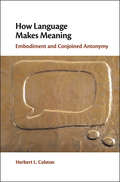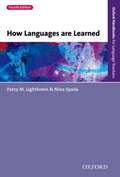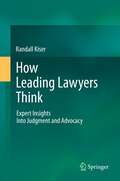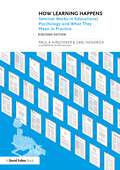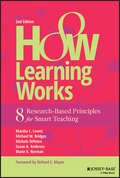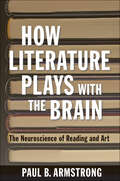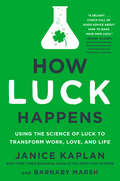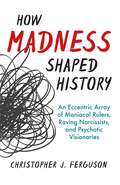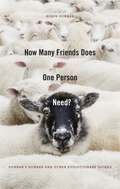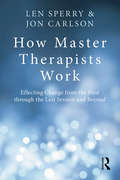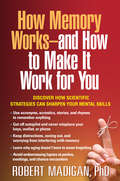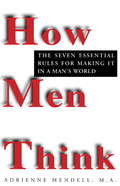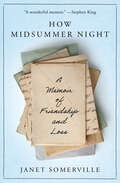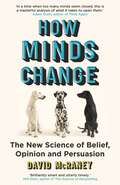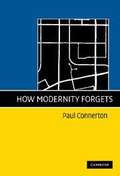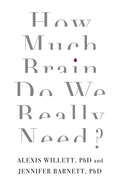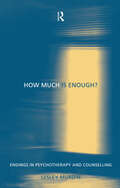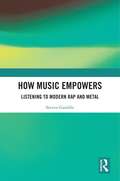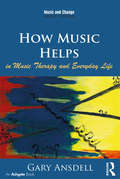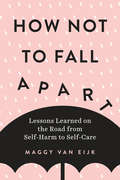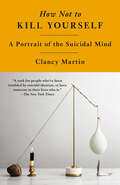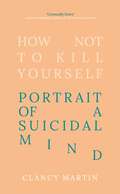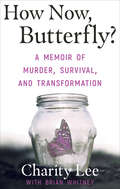- Table View
- List View
How Language Makes Meaning: Embodiment and Conjoined Antonymy
by Herbert L. ColstonLanguage's key function is to enable human social interaction, for which people are motivated to engage by powerful brain mechanisms. This book integrates recent work on embodied simulations, traditional meaning-making processes and a myriad of semantic and other meaning contributors to formulate a new model of how language functions following a pattern of conjoined antonymy. It investigates how embodied simulations,semantic information, deviation, omission, indirectness, figurativity, language play, and other processes leverage rich meaning from only a few words by using inherently biological, cognitive and social frameworks. The interaction of these meaning-making components of language is described and a language-functioning model based on recent neuroscientific research is laid out to allow for a more complete understanding of how language operates.
How Languages Are Learned (Fourth Edition)
by Patsy M. Lightbown Nina SpadaWritten by experienced teacher trainers and language learning experts, Patsy Lightbown and Nina Spada, How Languages Are Learned relates the theories of first and second language acquisition to what actually goes on in the classroom. It uses activities to explore the practical implications of the ideas presented. Evaluations and case studies are included throughout the book so that you can see a practical context for the research ideas you are reading about. Many of these examples are taken directly from real second language classrooms. Now in its 4th edition, How Languages Are Learned is highly valued for the way it relates language acquisition theory to classroom teaching and learning and draws practical implications from research for the language classroom. It is widely used as a reference book on teacher training courses, and is for new and experienced practising teachers. New to this editionUpdated to reflect the most recent research in the field of second language teaching and learning Activities and Questions for Reflection personalise content and support critical thinkingExtra activities, study questions and videos available onlineNow also available as an ebook from Amazon, Kobo and iBookstore
How Leading Lawyers Think
by Randall KiserIn this book, 78 leading attorneys in California and New York describe how they evaluate, negotiate and resolve litigation cases. Selected for their demonstrated skill in predicting trial outcomes and knowing when cases should be settled or taken to trial, these attorneys identify the key factors in case evaluation and share successful strategies in pre-trial discovery, negotiation, mediation, and trials. Integrating law and psychology, the book shows how skilled attorneys mentally frame cases, understand jurors' perspectives, develop persuasive themes and arguments and achieve exceptional results for clients.
How Learning Happens: Seminal Works in Educational Psychology and What They Mean in Practice
by Carl Hendrick Paul A. KirschnerHow Learning Happens introduces 32 giants of educational research and their findings on how we learn and what we need to know to learn effectively, efficiently, and enjoyably. Many of these works have inspired researchers and teachers all around the world and have left a mark on how we teach today.Now updated to include a new section on Memory and Cognition with five new chapters, this revised second edition explores a selection of the key works on learning and teaching, chosen from the fields of educational psychology and cognitive psychology. It offers a roadmap of the most important discoveries in the way learning happens, with each chapter examining a different work and explaining its significance before describing the research, its implications for practice, and how it can be used in the classroom – including the key takeaways for teachers.Clearly divided into seven sections, the book covers: Memory and cognition How the brain works Prerequisites for learning How learning can be supported Teacher activities Learning in context Cautionary tales Written by two leading experts and illustrated by Oliver Caviglioli, this is essential reading for teachers wanting to fully engage with and understand educational research as well as undergraduate students in the fields of education, educational psychology, and the learning sciences.
How Learning Works: Eight Research-Based Principles for Smart Teaching
by Marsha C. Lovett Michael W. Bridges Marie K. Norman Susan A. Ambrose Michele DiPietroApply these eight learning principles for more effective teaching As educators in the ever-evolving landscape of higher education, we are continuously challenged to keep our courses effective, engaging, relevant, and inclusive. The updated and expanded second edition of How Learning Works can help! It incorporates the latest research, provides a wider range of strategies, and adds a new principle to your toolkit. Readers will find eight essential learning principles that distill the overwhelming research literature into: Real-world teaching and learning scenarios Examples that reflect a diverse set of teaching environments and learner populations 150 practical strategies you can apply to your teaching context With these practical, broadly applicable insights, you can: Understand why your successful teaching approaches work Solve common teaching and learning problems Adapt your teaching to new modalities (e.g., online, hybrid) and challenges Ground your innovations in evidence-based practice Based on research from cognitive psychology, developmental psychology, education, anthropology, and more—this book makes learning work…for you and your students.
How Literature Plays with the Brain: The Neuroscience of Reading and Art
by Paul B. ArmstrongAn original interdisciplinary study positioned at the intersection of literary theory and neuroscience."Literature matters," says Paul B. Armstrong, "for what it reveals about human experience, and the very different perspective of neuroscience on how the brain works is part of that story." In How Literature Plays with the Brain, Armstrong examines the parallels between certain features of literary experience and functions of the brain. His central argument is that literature plays with the brain through experiences of harmony and dissonance which set in motion oppositions that are fundamental to the neurobiology of mental functioning. These oppositions negotiate basic tensions in the operation of the brain between the drive for pattern, synthesis, and constancy and the need for flexibility, adaptability, and openness to change.The challenge, Armstrong argues, is to account for the ability of readers to find incommensurable meanings in the same text, for example, or to take pleasure in art that is harmonious or dissonant, symmetrical or distorted, unified or discontinuous and disruptive.How Literature Plays with the Brain is the first book to use the resources of neuroscience and phenomenology to analyze aesthetic experience. For the neuroscientific community, the study suggests that different areas of research—the neurobiology of vision and reading, the brain-body interactions underlying emotions—may be connected to a variety of aesthetic and literary phenomena. For critics and students of literature, the study engages fundamental questions within the humanities: What is aesthetic experience? What happens when we read a literary work? How does the interpretation of literature relate to other ways of knowing?
How Luck Happens: Using the Science of Luck to Transform Work, Love, and Life
by Janice Kaplan Barnaby MarshNew York Times bestselling author Janice Kaplan examines the phenomenon of luck--and discovers the exciting ways you can grab opportunities and make luck for yourself every day. After spending a year researching and experiencing gratitude for The Gratitude Diaries, Janice Kaplan is back to tackle another big, mysterious influence in all our lives: luck. And this time she's joined on her journey by coauthor Dr. Barnaby Marsh, a renowned academic who guides her exploration. Together they uncover the unexpected, little-understood science behind what we call "luck," proving that many seemingly random events are actually under your--and everyone's--control. They examine the factors that made stars like Harrison Ford and Jonathan Groff so successful, and learn the real secrets that made Kate Spade and Warby Parker into global brands. Using original research, fascinating studies, and engaging interviews, Kaplan and Marsh reveal the simple techniques to create luck in love and marriage, business and career, and health, happiness, and family relationships. Their breakthrough insights prove that all of us--from CEOs to stay-at-home moms--can tip the scales of fortune in our favor. Through a mix of scientific research, conversations with famous and successful people--from academics like Dan Ariely and Leonard Mlodinow to actor Josh Groban--and powerful narrative, How Luck Happens uncovers a fascinating subject in accessible and entertaining style.
How Madness Shaped History: An Eccentric Array of Maniacal Rulers, Raving Narcissists, and Psychotic Visionaries
by Christopher J. FergusonThis book considers the impact of psychology on world events, looking at how mental illness and personality disorders have affected history. How have mental illness and personality disorders influenced history? This lively investigation demonstrates that, when conditions are ripe, one unstable individual can create the best or worst moments of a generation or even a century. Beginning with Alexander the Great, whose megalomania caused widespread bloodshed yet powerfully shaped world history through the spread of Greek culture, the author examines the various forms of mental illness among people of great influence. These includes emperors, like the Romans Caligula and Elagabalus, kings like George III of England and Charles II of Spain, and lesser known rulers such as sixteenth-century Hungarian noblewoman Elizabeth Bathory, who is in the Guinness World Records as the most prolific female serial killer of all time. In more recent times, the author considers the mental instability exhibited by dictators Adolf Hitler, Joseph Stalin, and Idi Amin, as well as female prison guard Irma Grese, whose cruelties at Auschwitz were infamous. He also discusses rumors of cognitive decline among American presidents Woodrow Wilson, Ronald Reagan, and Donald Trump, and the ways in which American democracy copes with the disability of its leaders. And he considers cases where whole societies seem to be gripped by the madness of mob rule. Ferguson concludes with an eye toward the future, considering the power of social media to amplify fringe ideas, giving extremist and outright crazy perspectives greater exposure and influence than ever before.
How Many Friends Does One Person Need?: Dunbar's Number And Other Evolutionary Quirks
by Robin DunbarWe are the product of our evolutionary history and this history colours our everyday lives - from why we kiss to how religious we are. In "How Many Friends Does One Person Need?" Robin Dunbar explains how the distant past underpins our current behaviour, through the groundbreaking experiments that have changed the thinking of evolutionary biologists forever. He explains phenomena such as why 'Dunbar's Number' (150) is the maximum number of acquaintances you can have, why all babies are born premature and the science behind lonely hearts columns. Stimulating, provocative and highly enjoyable, this fascinating book is essential for understanding why humans behave as they do - what it is to be human.
How Master Therapists Work: Effecting Change from the First through the Last Session and Beyond
by Jon Carlson Len SperryHow Master Therapists Work engages the reader in experiencing what really happens in therapy with master therapists: who they are, what they do, and how they bring about significant change in clients. It examines one master therapist’s actual six-session therapy (also available on DVD) that transformed a client’s life, resulting in changes that have been sustained for more than seven years. Session transcriptions directly involve the reader in every aspect of the therapeutic change process. This is followed by the commentary of a master therapist-psychotherapy researcher who explains how these changes were effected from a psychotherapy research perspective. Next, the master therapist who effected these changes explains what he was thinking and why he did what he did at key points in the therapy process. Then, the client shares her thoughts on this life changing therapeutic experience. This is a must have, one-of-a-kind book that will greatly enhance the therapeutic understanding and skills of both practicing therapists and therapists-in-training.
How Memory Works--and How to Make It Work for You: G1196
by Robert MadiganDo you wish you could recall the names of people you just met? What if birthdays, important errands, and online passwords rarely slipped your mind? Psychologist Robert Madigan is an expert in the "memory arts"--practical, proven methods for improving the ability to retain and use information. Like taking the stairs instead of the elevator, it's important to exercise memory in simple ways every day. That's where this science-based guide can help. Dr. Madigan explains how memory works and presents innovative mnemonic devices and visualization techniques that will help you sharpen your mental skills; avoid embarrassing lapses; and remember faces, appointments, facts, numbers, lists, and much more. Reclaim your brain--this book shows how.
How Men Think
by Adrienne Mendell"An interesting tool for working with gender differences."--John GrayAuthor of Men Are From Mars, Women Are From VenusMen at work do it all the time: They brag, cover up their mistakes, pretend to know what they don't, start fights. And they still get ahead! Why? As psychologist Adrienne Mendell learned when she interviewed one-hundred male executives, the traits that women spend their entire lives erasing from their personalities are actually the qualities that men value in the world of work. And since men are still in the power positions, if you don't play it their way, you don't play at all.Based on Mendell's interviews and her experience of counseling hundreds of frustrated career women, How Men Think identifies the seven rules that men learned by playing sports as children--games that excluded girls. These rules may seem simple on the surface, but understanding them as men do is anything but easy. You may have fallen into many of these traps yourself:* You're mad because you want your male boss to let you control your projects. But you've got to take control--that's the only way you'll get it.* You're steamed because a male colleague consistently takes credit for your work. Do you make a point of touting your accomplishments?* When you make a mistake you apologize. But the man you apologize to doesn't think you're polite--he thinks you're admitting incompetence.* A fight with a male colleague leaves you shaken. But the men in your office shout at each other for an hour and then go out for a beer.These are the times that try women's souls! The strategies, insights, and eye-opening advice in How Men Think will help you get along better with the boys and propel you to the top where you belong."The more women have opportunities to play sports the more proficient they will become in competing in this men's world of 'unwritten rules.' To bridge the gap, Mendell's book, How Men Think, is a necessary guide for women working with men."--Diane Everett, Ph.D. Executive Director National Association for Girls and Women in SportFrom the Trade Paperback edition.
How Midsummer Night: A Memoir of Friendship and Loss
by Janet SomervilleThe author chronicles the final months of the life of her close friend and fellow teacher, in this unique and unforgettable memoir. &“A wonderful memoir.&” —Stephen King When fifty-six-year-old Richard is diagnosed with glioblastoma, a rare and inoperable brain cancer, his colleague and friend Janet Somerville begins to document his life in a personal, months-long letter to him, to one day share with his wife and daughters. Teaching together at a Toronto boys&’ school, Janet and Richard bonded over their love of musical theater and literature. And now that Richard is nearing his end, it is these memories that comfort both of them through the good days and the bad. Peppered with theatrical references and inside jokes—from Shakespeare to Rodgers and Hammerstein, Monty Python to Avenue Q—the letter offers a touching glimpse into Richard&’s life. During his treatment, Janet shares with him the day-to-day activities of the school, including the unfiltered witticisms that fall from the mouths of teenage boys. Together they recollect stories of school choir trips, plays directed, and books read. Richard&’s positive attitude—his playfulness and graciousness—shines through the pages.How Midsummer Night is a beautiful tribute to a man who made his mark on his family and the community around him—a man who was so much more than just another teacher, so much more than just another friend. &“I love this book. It sings about grief.&” —Hart Hanson, author of The Seminarian &“This heartfelt memoir by Janet Somerville explores ways of drawing strength from art in a time of loss.&” —Linwood Barclay, international bestselling author of I Will Ruin You
How Minds Change: The New Science of Belief, Opinion and Persuasion
by David McRaney&‘In a time when too many minds seem closed, this is a masterful analysis of what it takes to open them&’ Adam Grant, author of the bestselling Think Again &‘Optimistic, illuminating and even inspiring&’ Guardian As the world is increasingly polarised, it feels impossible to change the mind of someone with a conflicting view. But this book shows that you could be one conversation away from changing someone&’s mind about something, maybe a lot of things. Self-delusion expert and psychology nerd David McRaney sets out to discover not just what it takes to influence others, but why we believe in the first place. Along the way he meets a former Westboro Baptist Church member who was deradicalised on Twitter, goes deep canvassing to see how quickly people will surrender their character-defining views, finds a 9/11 Truther who turns his back on it all, and reveals how, within a few years, half a country can go from opposing the &‘gay agenda&’ to happily attending same-sex weddings. Distilling the latest research in psychology and neuroscience, How Minds Change reveals how beliefs take hold, not over hundreds of years, but in less than a generation, in less than a decade, and sometimes in an instant.
How Modernity Forgets
by Paul ConnertonWhy are we sometimes unable to remember events, places and objects? This concise overview explores the concept of 'forgetting', and how modern society affects our ability to remember things. It takes ideas from Francis Yates classic work, 'The Art of Memory', which viewed memory as being dependent on stability, and argues that today's world is full of change, making 'forgetting' characteristic of contemporary society. We live our lives at great speed; cities have become so enormous that they are unmemorable; consumerism has become disconnected from the labour process; urban architecture has a short life-span; and social relationships are less clearly defined- all of which has eroded the foundations on which we build and share our memories. Providing a profound insight into the effects of modern society, this book is a must-read for anthropologists, sociologists, psychologists and philosophers, as well as anyone interested in social theory and the contemporary western world.
How Money Talks: How Money Talks (The\united Kingdom Council For Psychotherapy Ser.)
by Lesley MurdinMoney speaks in everyday life and in literature of our greed and our generosity, our pride and our humiliation and as it passes among us it shows our creativity and our ability to co-operate even while it can also lead us to fight to the death. This book is for psychological therapists and for the general reader interested in human nature. Money has mattered since the first human attempts to symbolise value and enable people to wait for the return on their own labours. Since the financial crisis of 2008 its impact at a macro as well as a micro level is inescapable. It has become a means of exchange, much like language and has opened up social mobility to factors other than birth. This book looks at the origin of money and its history but most of all, what attitudes to money tell us about the way we connect to each other.
How Much Brain Do We Really Need?
by Dr Jennifer Barnett Dr Alexis WillettYour brain is shrinking. Does it matter?How Much Brain Do We Really Need? challenges us to think differently about the brain. Rather than just concentrating on the many wonderful things it can do, this entertaining insight into the complexities and contradictions of the human brain asks whether in fact we can live satisfactorily without some of it.The bad news is that our brains start to shrink from our mid-thirties. But the good news is that we still seem to generally muddle along and our brain is able to adapt in extraordinary ways when things going wrong.Alexis Willett and Jennifer Barnett shed light on what the human brain can do - in both optimal and suboptimal conditions - and consider what it can manage without. Through fascinating facts and figures, case studies and hypothetical scenarios, expert interviews and scientific principles, they take us on a journey from the ancient mists of time to the far reaches of the future, via different species and lands.Is brain training the key to healthy ageing? Do women really experience 'baby brain'? Is our brain at its evolutionary peak or do we have an even more brilliant future to look forward to? We discover the answers to these questions and more.
How Much Brain Do We Really Need?
by Dr Jennifer Barnett Dr Alexis WillettYour brain is shrinking. Does it matter?Rethinking the Brain challenges us to think differently. Rather than just concentrating on the many wonderful things the brain can do, this entertaining insight into its complexities and contradictions asks whether in fact we can live satisfactorily without some of it.The bad news is that our brains start to shrink from our mid-thirties. But the good news is that we still seem to generally muddle along and our brain is able to adapt in extraordinary ways when things going wrong.Alexis Willett and Jennifer Barnett shed light on what the human brain can do - in both optimal and suboptimal conditions - and consider what it can manage without. Through fascinating facts and figures, case studies and hypothetical scenarios, expert interviews and scientific principles, they take us on a journey from the ancient mists of time to the far reaches of the future, via different species and lands.Is brain training the key to healthy ageing? Do women really experience 'baby brain'? Is our brain at its evolutionary peak or do we have an even more brilliant future to look forward to? We discover the answers to these questions and more.
How Much Is Enough?: Endings In Psychotherapy and Counselling
by Lesley MurdinHow Much is Enough? addresses this important question, looking at the reasons why therapy can go on for too long or can come to a destructively premature ending, and offering advice on how to avoid either, with a timely conclusion. Using vivid examples and practical guidelines, Lesley Murdin examines the theoretical, technical and ethical aspects of endings. She emphasises that it is not only the patient who needs to change if one is to achieve a satisfactory outcome. The therapist must discover the changes in him/herself which are needed to enable an ending in psychotherapy. How Much is Enough? is a unique contribution to therapeutic literature, and will prove invaluable to students and professionals alike.
How Music Empowers: Listening to Modern Rap and Metal
by Steven GambleHow Music Empowers argues that empowerment is the key to unlocking the long-standing mystery of how music moves us. Drawing upon cutting-edge research in embodied cognitive science, psychology, and cultural studies, the book provides a new way of understanding how music affects listeners. The argument develops from our latest conceptions of what it is to be human, investigating experiences of listening to popular music in everyday life. Through listening, individuals have the potential to redefine themselves, gain resilience, connect with other people, and make a difference in society. Applying a groundbreaking theoretical framework to postmillennial rap and metal, the book uncovers why vast numbers of listeners engage with music typically regarded as ‘social problems’ or dismissed as ‘extreme’. In the first ever comparative analytical treatment of rap and metal music, twenty songs are analysed as case studies that reveal the empowering potential of listening. The book details how individuals interact with rap and metal communities in a self-perpetuating process which keeps these thriving music cultures – and the listeners themselves – alive and well. Can music really change the world? How Music Empowers answers: yes, because it changes us. How Music Empowers will interest scholars and researchers of popular music, ethnomusicology, music psychology, music therapy, and music education.
How Music Helps in Music Therapy and Everyday Life (Music and Change: Ecological Perspectives)
by Gary AnsdellWhy is music so important to most of us? How does music help us both in our everyday lives, and in the more specialist context of music therapy? This book suggests a new way of approaching these topical questions, drawing from Ansdell's long experience as a music therapist, and from the latest thinking on music in everyday life. Vibrant and moving examples from music therapy situations are twinned with the stories of 'ordinary' people who describe how music helps them within their everyday lives. Together this complementary material leads Ansdell to present a new interdisciplinary framework showing how musical experiences can help all of us build and negotiate identities, make intimate non-verbal relationships, belong together in community, and find moments of transcendence and meaning. How Music Helps is not just a book about music therapy. It has the more ambitious aim to promote (from a music therapist's perspective) a better understanding of 'music and change' in our personal and social life. Ansdell's theoretical synthesis links the tradition of Nordoff-Robbins music therapy and its recent developments in Community Music Therapy to contemporary music sociology and music studies. This book will be relevant to practitioners, academics, and researchers looking for a broad-based theoretical perspective to guide further study and policy in music, well-being, and health.
How Not to Fall Apart: Lessons Learned on the Road from Self-Harm to Self-Care
by Maggy Van EijkWhat no one tells you about living with anxiety and depression—learned the hard way Maggy van Eijk knows the best place to cry in public. She also knows that eating super salty licorice or swimming in icy cold water are things that make you feel alive but, unlike self-harm, aren't bad for you.These are the things to remember when you're sad. Turning 27, Maggy had the worst mental health experience of her life so far. She ended a three-year relationship. She lost friends and made bad decisions. She drank too much and went to ER over twelve times. She saw three different therapists and had three different diagnoses. She went to two burn units for self-inflicted wounds and was escorted in an ambulance to a mental health crisis center. But that's not the end of her story.Punctuated with illustrated lists reminiscent of Maggy's popular BuzzFeed posts, How Not to Fall Apart shares the author's hard-won lessons about what helps and what hurts on the road to self-awareness and better mental health. This is a book about what it's like to live with anxiety and depression, panic attacks, self-harm and self-loathing--and it's also a hopeful roadmap written by someone who's been there and is still finding her way.
How Not to Kill Yourself: A Portrait of the Suicidal Mind
by Clancy MartinFINALIST FOR THE KIRKUS PRIZE FOR NONFICTION • ONE OF TIME'S 100 MUST-READ BOOKS OF THE YEAR • ONE OF THE NEW YORK TIMES BOOK REVIEW'S CRITICS' PICKS • ONE OF THE BOSTON GLOBE&’S 55 BOOKS WE LOVED THIS YEAR • ONE OF KIRKUS&’S BEST NONFICTION BOOKS OF THE YEAR• An intimate, insightful, at times even humorous blend of memoir and philosophy that examines why the thought of death is so compulsive for some while demonstrating that there&’s always another solution—from the acclaimed writer and philosophy professor, based on his viral essay, &“I&’m Still Here.&” &“A deep meditation that searches through Martin&’s past looking for answers about why he is the way he is, while also examining the role suicide has played in our culture for centuries, how it has evolved, and how philosophers have examined it.&” —Esquire &“A rock for people who&’ve been troubled by suicidal ideation, or have someone in their lives who is.&” —The New York Times&“If you&’re going to write a book about suicide, you have to be willing to say the true things, the scary things, the humiliating things. Because everybody who is being honest with themselves knows at least a little bit about the subject. If you lie or if you fudge, the reader will know.&”The last time Clancy Martin tried to kill himself was in his basement with a dog leash. It was one of over ten attempts throughout the course of his life. But he didn&’t die, and like many who consider taking their own lives, he hid the attempt from his wife, family, coworkers, and students, slipping back into his daily life with a hoarse voice, a raw neck, and series of vague explanations.In How Not to Kill Yourself, Martin chronicles his multiple suicide attempts in an intimate depiction of the mindset of someone obsessed with self-destruction. He argues that, for the vast majority of suicides, an attempt does not just come out of the blue, nor is it merely a violent reaction to a particular crisis or failure, but is the culmination of a host of long-standing issues. He also looks at the thinking of a number of great writers who have attempted suicide and detailed their experiences (such as David Foster Wallace, Yiyun Li, Akutagawa, Nelly Arcan, and others), at what the history of philosophy has to say both for and against suicide, and at the experiences of those who have reached out to him across the years to share their own struggles.The result combines memoir with critical inquiry to powerfully give voice to what for many has long been incomprehensible, while showing those presently grappling with suicidal thoughts that they are not alone, and that the desire to kill oneself—like other self-destructive desires—is almost always temporary and avoidable.
How Not to Kill Yourself: Portrait of a Suicidal Mind
by Clancy MartinThe last time Clancy Martin tried to kill himself was in his basement with a dog leash. He didn&’t write a note. How Not to Kill Yourself is an affirmation of life by someone who has tried to end it multiple times. It&’s about standing in your bathroom every morning, gearing yourself up to die. It&’s about choosing to go on living anyway. In an unflinching account of his darkest moments, Clancy Martin makes the case against suicide, drawing on the work of philosophers from Seneca to Jean Améry. Through critical inquiry and practical steps, we might yet answer our existential despair more freely – and with a little more creativity.
How Now, Butterfly?: A Memoir of Murder, Survival, and Transformation
by Brian Whitney Charity LeeA mother recounts her unthinkable experience after her thirteen-year-old son murders his little sister—and her struggle to emerge from devastation. Losing a young daughter to murder is the worst nightmare that a mother could possibly imagine—but what if the killer was her son? Charity Lee was thrust into this unimaginable situation when her thirteen-year-old son, Paris, murdered her beloved four-year-old daughter, Ella. Charity goes through intense grief at the loss of her daughter, while at the same time trying to understand why her son would have done something as horrific as this, and how she could have missed the signs that Paris was a true psychopath. While barely holding herself together throughout her intense grief, Charity is still a mother and feels a need to advocate for her son to receive appropriate treatment while incarcerated, while at the same time trying to ensure he stays in prison so he can never hurt someone again. Charity still loves her son and craves a connection with him despite all he has done. Because of her experiences, she rebuilds her life and starts a non-profit to help other families of victims, as well as offenders. This book is a meditation on grief, loss, and forgiveness unlike any other. It&’s also an inspirational story of a true survivor. How Now, Butterfly? is a haunting memoir that no reader will soon forget.
